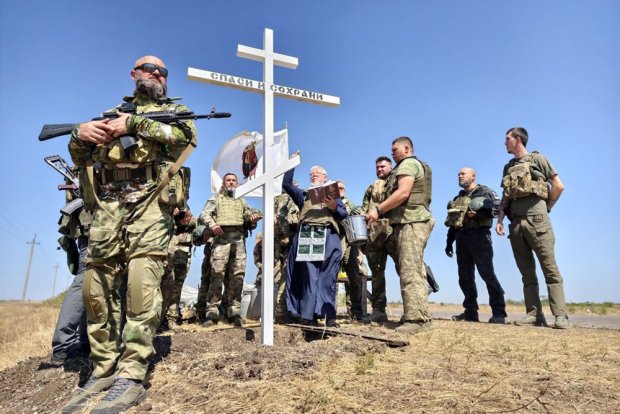
Russia Occupies Zaporizhzhia Oblast the Cossack Way
Publication: Eurasia Daily Monitor Volume: 21 Issue: 146
By:

Executive Summary:
- Moscow and the All-Russia Cossack Society completed the documentation necessary to create full-fledged Russian Cossack societies in Ukraine’s occupied Zaporizhzhia oblast.
- The Kremlin may use Russian Cossack organizations in Ukraine as a pretext to mobilize men while simultaneously providing a new legitimation for their war in Ukraine by creating reserve armies through these societies.
- By integrating Cossacks into major events of Russian history, Moscow is playing “memory politics,” making their role in modern Russia, and, in their eyes, Eastern Ukraine, seem historically inevitable.
Moscow is seeking to deepen its presence in Ukraine’s Zaporizhzhia oblast despite its lack of practical control in these regions. Russia is focusing on developing Cossack societies to further cultivate its presence, as revealed in plans by Ataman of the All-Russian Cossack Society (VsKO), Vitaly Kuznetsov. In late August, the Presidential Council for Cossack Affairs, the Federal Agency for Ethnic Affairs, the Government of the Zaporizhzhia oblast, and the headquarters of the VsKO completed the documents necessary for the creation of full-fledged Cossack societies in the region (Kazachestvo.ru, August 20). On August 21, the Russian stooge in Zaporizhzhia, Governor Yevgeny Biletsky, signed a decree approving Cossack charters. Artem Sharlai, head of the national, religious, and Cossack charters of Zaporizhzhia’s Department of Internal Policy, said all Cossack societies in the region must be registered due to the current state of war, as “we are under martial law.” He continued, saying, “The [VsKO] considers the formation of Cossack organizations in the regions as a kind of mobilization reserve; the country needs fighters; why do we need Cossacks if they are not ready to fight?” (Kazachestvo.ru, September 19). This corresponds to earlier observations that the Kremlin may use Cossack organizations as a pretext to mobilize men while simultaneously providing a new legitimation for their war in Ukraine (CEPA, August 14; see EDM, September 30).
In addition to forming reserve units, one of the unspoken precepts of the new societies is to allow Moscow to claim Cossack heritage as indigenous only to Russia. Sharlai stated that “there were Cossack societies in Ukraine, but they were costume groups simply trying to make money. They did everything there except defend their motherland, so the serving Cossacks are being formed here for the first time” (Kazachestvo.ru, September 18). Apart from the fact that the Russian Cossacks allow even those without authentic cultural ties to Cossack culture to join, the second claim is also disingenuous (see EDM March 8, 2023, May 1). Unless Sharlai is implying that Russia has always been the motherland of the Cossacks—irrespective of legal categories—the Cossacks have played a role in Ukraine’s historical defense, most notably in recent history after Russia’s annexation of Crimea in 2014 (see EDM, May 22; Military-Scientific Journal, 2024). Overall, the claim that Ukrainian Cossack organizations were inauthentic and profit-oriented in comparison to their Russian counterparts is an attempt to delegitimize Ukrainian Cossack heritage further, an extension of Russia’s delegitimization of the Ukrainian ethnicity and Ukraine’s national status as a whole.
Sharlai continued outlining the nuances of creating Cossack organizations in the two Ukrainian oblasts. Two primary Cossack organizations will be formed in each urban district and one in the municipality, with subdivisions of these primary units to follow. Atamans have also been identified to lead the new Cossack organizations. Similarly, in support of “traditional Cossack culture,” two educational courses have already been formed, and there is an expectation of many more in the future. “Ideally, [there will be] one in each municipal district. Children will be able to come to the Cossacks, learn from them, and take examples” (Kazachestvo.ru, September 18). Kremlin control over the regions will permeate from this ideological layer down to the foundations of everyday life (see EDM, February 27).
These developments support the notion that Moscow is relying more heavily on the Cossack narrative as a new legitimation for the ongoing war (see EDM, September 30). The Russian government is preparing a new law “on Russian Cossackdom.” From past results, it seems unlikely that this will lead to any decrease in their status within Russian society (VsKO, October 3). There are now “2,900 Cossack educational institutions of varying levels, in which 320,000 people study,” and plans to expand the number of Cossack Cadets Corps in Siberia. Vitaly Kuznetsov continued to thank Russia’s deputy prime minister, Tatyana Golikova, for supporting the development of the Russian Cossack troops (VsKO, October 1). A relative political heavyweight, Golivka’s support of the Cossacks as a state-organized social movement lends heft and gravitas to their narrative in Russian politics.
The Cossacks are being woven into historical narratives around the fourteenth-century battle of Kulikovo field, where Russian forces dealt a severe blow to the Mongol Golden Horde’s rule of Russia. The Russian government claims a direct connection between the intelligence service reforms of Prince Donskoy, who led the battle, and the Cossacks. Highlighting the Cossack role in ancient Russian history ensures that, as stated by the director of Russia’s State Military Historical Reserve “Kulikovo field,” Vladimir Gritsenko, “our contemporaries do not get the impression that the fate of the world is decided exclusively in the capitals” (Kazachestvo.ru, August 28). By integrating Cossacks into the major events of Russian history, the state is playing “memory politics,” making their role in modern Russia and, in their eyes, Eastern Ukraine seemingly historically inevitable.



